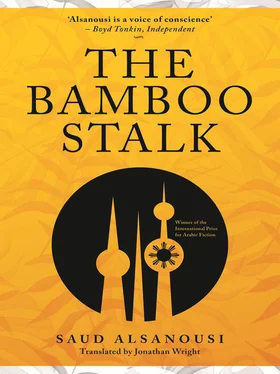Understand why I am being so frank, so bold, or so insolent. I liked you because I thought I was one of you. That’s how I came to hate you and to hate myself.
And because I don’t want to take my feelings about you back to the Philippines, I’m writing them down here now, so that I can leave them here.
You might read my words and what some people think of you. I might have a child in the Philippines one day and tell him about the land of dreams and point my finger towards paradise. Then he might pack his bags to go there and find that the paradise he has heard of really is a paradise.
I apologise for being so harsh. It may not be your fault but the fault of my father, who brought me to your land after I had spent many years in the Philippines. He wanted to replant me, forgetting that tropical plants don’t grow in the desert.
Take these pages and give me back my humanity, or take what humanity I still have left.
Take my humanity, which you didn’t recognise, and let me live like an ant, like a bee, like a cockroach, but without those antennae that insects have.
* * *
She was crying as I read to her over the phone.
‘Shall I stop?’ I asked her.
She laughed despite her crying. ‘Go on, go on reading, you crazy,’ she said. I went on reading what I had written. She gave a long sigh after I finished reading, while I said nothing. ‘You made me happy, as much as you made me cry,’ she said. ‘Isa,’ she finally pleaded, ‘I asked you to write before, and now I beg you — write, for yourself, for me, for Father, for Aunt Hind and Ghassan and everyone here.’
‘What I might write will be painful to everyone, Khawla,’ I replied.
‘There’s no need to remind me,’ she said confidently. ‘Father never cared about anyone in what he said or wrote or did. Why shouldn’t you be like him?’ She paused, and then continued, ‘If I wasn’t caught up in this family net nothing would stop me writing honestly. Have you forgotten? You’re the only person who can slip through the holes in the net without getting caught in the mesh.’ She hung up and I found myself asking Ibrahim, who was busy working, for more pieces of paper.
I picked up my pen and resumed writing, in English — My name is José . I stopped and thought of that José Rizal saying: ‘He who cannot love his mother tongue is worse than a beast and smells fouler than dead rotten fish.’ I don’t want to smell worse than a rotten fish and if I was a rotten fish it would spoil all the fresh fish around it, as Grandmother says when she’s worried about me coming into contact with her other grandchildren.
I decided to write in Filipino, even if the script is the same as the script used in English. I turned to Ibrahim, who was lying on his mattress getting ready to fall asleep. ‘Ibrahim,’ I said. He turned towards me with sleepy eyes. ‘Would you translate a text for me?’ I asked.
‘That’s my job,’ he said with a smile.
I sat up straight. ‘It’ll be a long text,’ I explained.
He looked at me sceptically. ‘It depends what’s in it,’ he said.
I explained my idea to him. He was hesitant at first, but he agreed after setting some conditions. ‘You’ll be free to translate it however you like, given your experience here, but mind you don’t write my name in a way other than it’s written in the Philippines — José.’ He fell asleep but there was no way I was going to sleep. I picked up the pen again and wrote in Filipino:
My name is José. In the Philippines it’s pronounced as in English, with an h sound at the start. In Arabic, rather like in Spanish, it begins with a kh sound. In Portuguese, though it’s written the same way, it opens with a j , as in Joseph. All these versions are completely different from my name here in Kuwait, where I’m known as Isa.
THE FINAL PART
Isa. . Looks Back
‘If the land rejects our bodies, the hearts of friends will provide a home for our spirits.’
José Mendoza
The Last Chapter
I finished writing the first chapter of this story on my last day in Kuwait. I handed it to Ibrahim in hard copy on the day Ghassan took me to the airport in his beloved car, and we agreed that I’d send him each chapter from the Philippines by email as soon as I finished it.
The airport was sad, though not in the way it was on the day I arrived. The flags were not at half mast and the chairs in the café were not upside down on the tables. But Khawla’s face and the faces of my crazy friends were all like Ghassan’s face.
At the departures gate, as I stood with my blue passport in my hand, the Boracay gang gathered around me, along with Ghassan and Ibrahim Salam. Some hugged me, others shook my hand and others slipped envelopes full of money into my hand. ‘This is the last call for passengers on Kuwait Airways flight 411 to Manila. Please proceed to the departure gate immediately.’
The circle of friends broke up to make way for Khawla to come through. She came forward slowly and then hugged me tight. The hug went on a long time. ‘That’s enough, Khawla,’ Ghassan said. ‘The plane’s about to take off.’
‘Good,’ she said, her head buried in my shoulder. My friends moved apart around me. The circle widened to let through Hind, who took me by surprise by turning up. Ghassan withdrew and left, and my other friends stepped back. Hind took hold of my sister by the shoulders and tugged at her gently. Khawla hugged me tight and insisted on staying with me. She squeezed me in her arms. Hind slipped her arms between me and Khawla and pulled her back. Khawla held on to me. She was still crying and Hind patted her on the back. Hind looked at me with a face as sad as all the other faces. ‘Forgive me, Isa,’ she said.
With a big smile, and plenty of tears, I nodded without speaking. I turned away from everyone and went through the departure gate, and only then did I turn back and look through the glass. Everyone was watching me leave except for Khawla, who was in Hind’s arms, and Ghassan, who had disappeared as soon as Hind appeared.
I left Kuwait in August 2008, about three years ago, abandoning everything except the bottle with soil from my father’s grave, the small Kuwaiti flag that had been attached to the back of my bicycle, a copy of the Qur’an in English, a prayer rug (I don’t know whether I’ll use it regularly), and the empty, cracked shell of my dead tortoise, Inang Choleng.
Today is Thursday, 28 July 2011, and it’s half past eight in the evening. In half an hour a football match between the Philippines and Kuwait will kick off — a qualifying match for the World Cup in Brazil in 2014.
A few days ago the Kuwaiti players arrived to train at the University of Makati stadium in preparation for today’s match, but shortly after they arrived Manila was hit by an earthquake that measured six on the Richter scale. I made a link between their arrival in Manila and the occurrence of the earthquake. Who is jinxing who? I drove the idea out of my head.
The Boracay crazies aren’t far away. They’re now sitting in the Rizal Memorial Stadium to support their team. I met them at Nino Aquino airport yesterday and tomorrow I’ll be seeing them off. If they decide to stay longer, we could go visit Boracay again.
I’m going to submit this chapter of my book to Ibrahim Salam in hard copy, as I did with the first chapter. The crazies will take it to him and when he’s translated it he’ll give it to Khawla. Maybe, once she’s seen the last part written by hand, even in a language she doesn’t know, she’ll be encouraged to finish off Father’s novel.
* * *
I’m now sitting in the sitting room in front of the television in our house in Mendoza’s land, with my last piece of paper in my hand. Everyone is here and they are all watching excitedly as the players come out on to the pitch, except for Adrian, who’s off in his own world. On the carpet in the middle of the room my little baby boy is crawling, oblivious of everything around him.
Читать дальше












